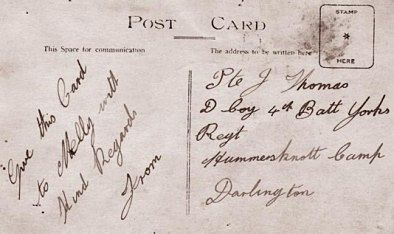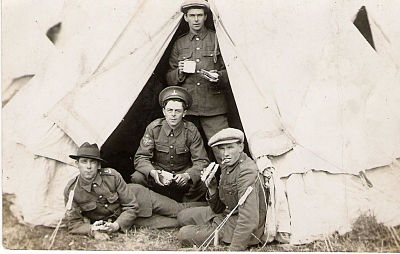
|

1631 Pte James Henry Thomas.
Photograph probably taken at Hummersknott Camp, Darlington in September 1914.
James was to be seriously wounded at Ypres and was repatriated to his home in Brotton, where he died on the 11th September
1915. He is buried in Brotton Cemetery.
[Photograph kindly contributed by John Sheen, author of Tyneside Irish, Durham Pals, & Wearside Battalion.]
|
Squire Wharton, of Skelton Castle also spoke a few words.
He regretted that his time in command of the Battalion was over last year, and also said that it was with great effort
to him to see them go without him. By this time he would have been around 55 years of age.
The Army List for August 1914 showed the following Officers as belonging to the 4th Battalion.:-
Colonel A F Godman. CB.VD. Hon Colonel.
Lt Col M H L Bell. VD in Command.
Major H G Scott.
Capt H C Matthews - Capt B Jackson -
Capt A Graham - Capt R A Constantine
Capt G H Bowes-Wilson - Capt W W Constantine - Capt J V Nancarrow -
Capt B H Charlton.
Lieutenants -
W F Mott, J Maughan,
N W Stead, T H Hutchinson,
L P I'Anson, T W P L Chaloner,
G W Samuelson, A C P de la P Beresford-Pierse.
|

Colonel William Henry Anthony Wharton of Skelton Castle. Commanding Officer of the 4th Battalion.
[Photograph kindly contributed by Graham Smallburn of Birmingham.]
|
Second Lieutenants - C R Scate, E Williams,
C C Jervelund, A J B Richardson,
H T Fawcett.
Adjutant - Capt G D P Eykyn.
Quartermaster - Lt W H Colton.
Medical Officers - Major H L de Legh. RAMC and Surgeon-Captain C B Whitehead.
Chaplains - Rev H C Holmes and Rev F L Perkins.
10 AUGUST After 5 days at Northallerton the Battalion moved to Newcastle upon Tyne.
17 AUGUST The Battalion joined the Brigade Camp at Hummersknott Park, Darlington.
23 AUGUST. The Battle of Mons in Belgium. Outnumbered and outgunned, British and French forces retreated into
France.
5 SEPTEMBER. The German advance came within 30 miles of capturing Paris, but their lines were severely
stretched.
The allies counter-attacked and forced them to stop at the Battle of the Marne.
14 SEPTEMBER. - The local 4th Battalion moved back to Newcastle where the whole of the Northumbrian Division was billeted.
It would not move to the Continent until the following April and there followed a period of intense training.
‘All training was done in full ‘marching order’, i.e. full pack and haversack, one hundred and twenty rounds of ammunition in pouches, full water bottle, rifle and bayonet and entrenching tool blade hanging in its case beneath the pack and its handle strapped alongside the bayonet scabbard.
From October onwards, training was mostly on a battalion basis interspaced with brigade and divisional field days.
|
Cross-country attacks in artillery formation, ending in bayonet were varied with long route marches and sometimes digging trenches.
Of course we grumbled and groused, cursing the weight of our kit,
|

|
but the hard training made us ready and fit for the stern trials of the Ypres salient in April 1915 in which we went not only carrying the full kit already described, but an extra hundred rounds of rifle ammunition in bandoliers’
About this time the War Office announced that if 80 percent of the Battalion were to volunteer for service abroad,
it would be permitted to embark as a unit.
|

Section of Army Form B111. Attestation.
Recruits were flocking to join up. Isaac Dobson, Ironstone miner of Lingdale
enlisted on the 2nd September 1914.
He was to be killed on the 15th September 1916 at Martinpuich, Somme.
|
90 percent did so and such was the enthusiasm to fight for the cause, another two hundred recruits were ready and
waiting to join.
The Battalion was redesignated the 1/4th, as a new 2/4th Battalion was to be formed to take over their role of Home Defence and train new recruits.
15 SEPTEMBER. The Germans retreated to strong points and began to "dig in".
Each side tried to outflank the other, north and west, digging trenches as they went.
This "race to the sea" ended with bloody warfare around Ypres, where the last gap was left and it was vital to
prevent the Germans capturing the Channel ports.
14 OCTOBER to 22 NOV. The First Battle of Ypres.
In early October the British Expeditionary Force drove the Germans back and recaptured this Belgian town driving a wedge
into the German line - the Ypres Salient. The BEF comprised originally the well trained British Regular Army units, many of which had been
recalled from policing the outposts of the British Empire.
|
 Men of the 4th Battalion at Camp.
Men of the 4th Battalion at Camp.
[Photo kindly donated by Peter Appleton of Skelton, N Yorks.]
|
On the 15th October the Germans, with a superiority in numbers of something like 5 to 1, launched a counter attack and in
the fierce fighting that followed lost 135,000 men. Many of these were young reservists and volunteers against the well trained
regular British Army who could fire a rifle like a machine gun.
The German mothers called it the kindermorde - the murder of
the children. But the Kaiser, who had called the British Army "contemptible" had launched an explosion of imagined Teutonic superiority
that was to ruin all of Europe, including Britain. for decades to come.
However British losses had also been severe. By the end of November 1914 Britain had lost a large proportion of its
Regular Army - 86,000, since the War began.
The German Kaiser had called the British Expeditionary Force "a contemptible little Army" and they were thereafter called
the "Old Contemptibles".
By their actions they had saved the vital Channel ports and given Britain time to reinforce.
By the end of the year it was impossible for one side to outflank the other, for a line of trenches stretched some
400 miles, from the Channel coast all the way across Northern France to the Swiss border.
The scene was set for four years of bloody attrition.
|
16 DECEMBER. On the morning of this day for an hour and a half
German warships shelled the North East coast with much damage caused at Hartlepool, Whitby and Scarborough. The casualties of 137 dead and 592 wounded, including women and children, aroused outrage and the desire for revenge.
A Nurse at the Auxiliary Hospital, Harrogate was living in the village of Grosmont, near Whitby and wrote the following to her mother:-
Suddenly at 9.10 am we heard what the children thought was blasting, only very near, the windows rattled and the house shook again and again. I said, "I am sure it is firing off the coast"...
I can tell you the sound was pretty terrifying but it only lasted 10 minutes, the car was ordered and away we flew to Whitby.
We were there about three quarters of an hour after the two German cruisers had gone, but the houses they had wrecked were awful.
When we got near Whitby we saw streams of people with panic stricken faces trying to get away.
I never want to see such a thing again...
Telegraph wires hanging like threads all snapped, huge gaping holes in the side of houses, roofs off, glass smashed everywhere and old women shaking with fright and sobbing.
We picked up lots of bits of shell. I have one in my pocket as I write.
The two German cruisers fired at the coastguard station, shot that to bits and killed one coastguard, we saw the stretcher being carried.
Some of the coastguards said the cruisers came in so close they could see the men working on their decks.
We hear that these cruisers have visited Scarborough and other places and damaged them, but as all wires are out order it is difficult to get news.
In one street the venetian blinds had been blown right across the street, lamp post upturned and I saw a pool of blood in front of a house so went in to see if anyone was hurt.
Portions of furniture, doors and windows were lying about the streets and in the fields just outside the town are large holes about 5 or 6 feet square. If the shells had been fired earlier when people were in bed I should think hundreds would have been killed as so many of the bedrooms were struck.
|
|



